
From 1966 to 1976, the Chinese Cultural Revolution adopted the slogan, “Thoroughly criticize the ‘theory of human nature’ of landlord and capitalist classes.” Millions in the factories and agricultural collectives fought to make this part of the Chinese Communist Party line.
SEATTLE (US), December 15— “Is the international working-class capable of making a communist revolution?” This is an important question among the workers we speak with.
The recent Boeing strike here lasted nearly eight weeks. During this time, ICWP comrades raised many revolutionary ideas among the young, diverse workforce and older retirees. Even after the strike ended, these debates continue to spread among many more of our friends.
Since the strike, friends and comrades have debated whether “human nature” would sabotage communist struggle. Some are reading sections of Red Bread. This book, written in 1931, reports on the campaign for communist collective farms after the Russian Revolution and how it led to a new view of human nature. Selfishness began to yield to the common good.
Two chapters stand out. One describes how a landlord before the Soviet revolution chose to join a collective farm in a Russian village. When asked why he gave up his estate to become a herdsman in the collective, he explained how his view of human nature had changed.
“Why,” he asked, “should any man enjoy things that his neighbor has not got? In the old days had a man propounded such a question to me, I’d have thought him a hopeless fool or maniac. I was reared in the idea that some people are better than others and therefore entitled to better things. These inequalities are wrong, desperately, brutally wrong,” he concluded.
In the next chapter, the author, Maurice Hindus, is schooled by Vera, an 18-year-old milkmaid from another collective. Hindus is skeptical about communism. He challenges her to carefully examine everything she believes. He taunts her with a list of fancy clothes that US teenagers supposedly wear.
Vera asks what the social purpose of these teenagers is. “What is the objective in their lives? Have they nothing outside themselves to live for, something for society, for the masses?” She concludes, “Living just for myself? Never.”
Some friends who read this chapter found it hard to believe that an 18-year-old could hold so diligently to the collective good and reject individualism so vehemently.
But “human nature” changes in accordance with the system of rule. What is thought of as human nature looks very different with communism than under capitalism. We currently only have a broad, day-to-day experience of human nature under capitalism, the system under which we struggle. Even so, we have many examples of how people live out communist values. This gives us a basis for understanding that human nature will be different when we live in communist collectivity and sharing.
In communism, wage slavery will be abolished. Society will promote work for the common good, not exploitation and profits for the capitalists. Social changes like collective work for the international needs of the working-class will create a new “human nature” among the masses.
An example: In Gaza, conditions are indescribably harsh, and we might expect to see the worst of “human nature.” But quite the opposite has been happening.
In Rafah, a young girl was trapped in the rubble from bombing. When people finally extricated her, she was dizzy, disoriented, and dehydrated. Although people there were getting only one meal every other day and a liter of water to last several days, children and adults lined up to donate water to wash her. People skipped their meals so she would not go hungry or thirsty. This was the nurturing love of humanity.
Now and in the future, doing collective, communist work changes “human nature” for the better. Join ICWP to be part of that change and help build a communist future for the whole working class.
Read our series on the History of the Chinese Great Proletarian Cultural Revolution here

